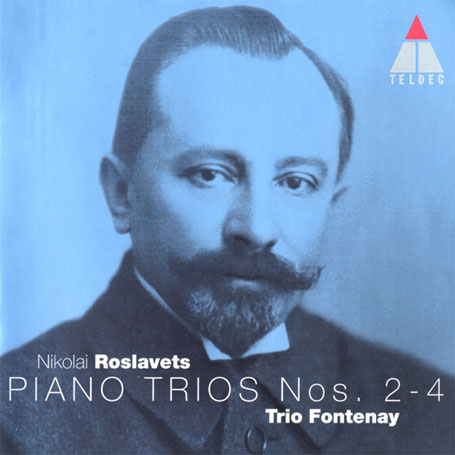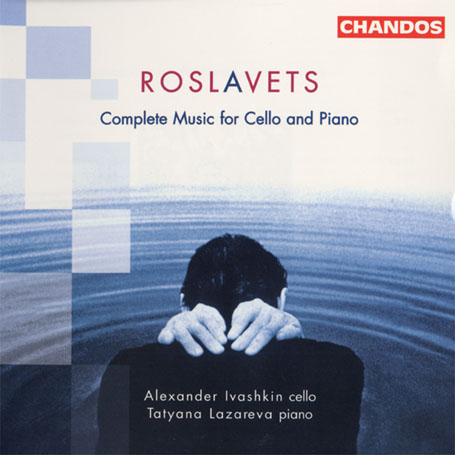Roslavets Cello Sonatas. Piano Works
View record and artist detailsRecord and Artist Details
Composer or Director: Nikolay Andreyevich Roslavets
Label: Teldec (Warner Classics)
Magazine Review Date: 6/2001
Media Format: CD or Download
Media Runtime: 70
Catalogue Number: 8573 82017-2

Tracks:
| Composition | Artist Credit |
|---|---|
| Piano Trio No. 2 |
Nikolay Andreyevich Roslavets, Composer
Fontenay Trio Nikolay Andreyevich Roslavets, Composer |
| Piano Trio No. 3 |
Nikolay Andreyevich Roslavets, Composer
Fontenay Trio Nikolay Andreyevich Roslavets, Composer |
| Piano Trio No. 4 |
Nikolay Andreyevich Roslavets, Composer
Fontenay Trio Nikolay Andreyevich Roslavets, Composer |
Composer or Director: Nikolay Andreyevich Roslavets
Label: Chandos
Magazine Review Date: 6/2001
Media Format: CD or Download
Media Runtime: 57
Mastering:
DDD
Catalogue Number: CHAN9881

Tracks:
| Composition | Artist Credit |
|---|---|
| Méditation |
Nikolay Andreyevich Roslavets, Composer
Alexander Ivashkin, Cello Nikolay Andreyevich Roslavets, Composer Tatyana Lazareva, Piano |
| Sonata for Cello and Piano No. 1 |
Nikolay Andreyevich Roslavets, Composer
Alexander Ivashkin, Cello Nikolay Andreyevich Roslavets, Composer Tatyana Lazareva, Piano |
| (5) Preludes |
Nikolay Andreyevich Roslavets, Composer
Nikolay Andreyevich Roslavets, Composer Tatyana Lazareva, Piano |
| Cello Sonata No. 2 |
Nikolay Andreyevich Roslavets, Composer
Alexander Ivashkin, Cello Nikolay Andreyevich Roslavets, Composer Tatyana Lazareva, Piano |
| Dance of the White Girls |
Nikolay Andreyevich Roslavets, Composer
Alexander Ivashkin, Cello Nikolay Andreyevich Roslavets, Composer Tatyana Lazareva, Piano |
Author:
The shorter pieces on Ivashkin’s survey give us Roslavets in essence. In Dance of the White Girls, the dreamy opening undulations are channelled through a sequence of harmonic dislocations. Meditation finds repose in the often rhetorical relationship between cello and piano, the capricious central section offsetting the sustained inwardness elsewhere.
Formal structures are ingenious if often reckless. In Piano Trio No 2, Scriabinesque expression is filtered through a Schoenbergian form which undermines the clear binary structure referred to in the booklet-note. Its successor is more restrained, the underlying mood elegiac rather than passionate. The First Cello Sonata achieves a more satisfying formal balance in its integration of four-movement form within a tensile sonata-allegro, its energy amply conveyed by Ivashkin. He brings equal conviction to Cello Sonata No 2, a single-movement exploration of contrast and coherence, and if the impressively wrought opening paragraph (to 5'43) almost pre-empts what follows, the gravity of the discourse is never in doubt.
The Five Preludes are related to the febrile late works of Scriabin, though the latter’s Op 74 Preludes have a concentration which makes Roslavets seem diffuse in comparison. A far cry from the Fourth Piano Trio, whose multi-movement groundplan and thematic rigour find the composer employing advanced harmonic means to more classical formal ends. Yet the first movement’s quirky formal logic, the scherzo’s Bartokian parody, the Lento’s haunted introspection and the finale’s desperately affirmative resolution were hardly designed to appeal to Soviet audiences then enthralled by the latest Western operatic novelties of Berg and Krenek, and stood little chance once Socialist Realism held sway.
The Fontenay Trio bring the poise and incisiveness that distinguish their forays into the classical repertoire, and make a strong case, as do Ivashkin and Lazareva, for this music’s revival. Roslavets seems destined to achieve only a modicum of wider acceptance; though it’s hard to believe this taciturn, disquieting figure would have wanted it any other way
Discover the world's largest classical music catalogue with Presto Music.

Gramophone Digital Club
- Digital Edition
- Digital Archive
- Reviews Database
- Full website access
From £8.75 / month
Subscribe
Gramophone Full Club
- Print Edition
- Digital Edition
- Digital Archive
- Reviews Database
- Full website access
From £11.00 / month
Subscribe
If you are a library, university or other organisation that would be interested in an institutional subscription to Gramophone please click here for further information.




